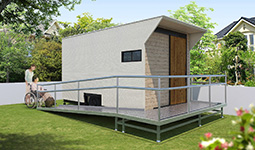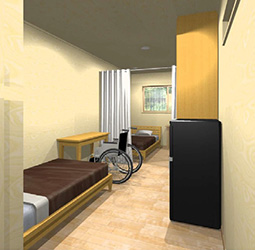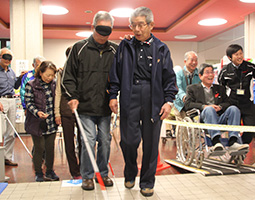Home > Highlighting JAPAN > Highlighting Japan May 2019 > Regional Revitalization
Highlighting JAPAN
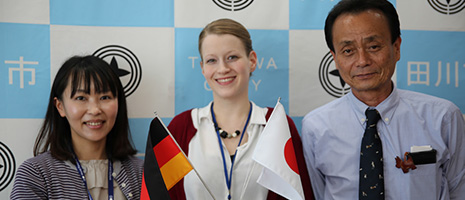
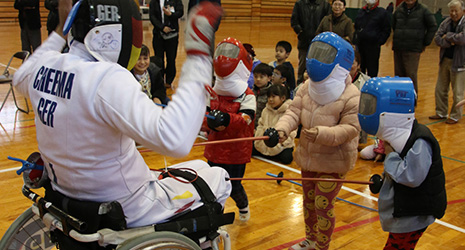
A Community Re-Energized by the Olympic and Paralympic Games
Tagawa City, Fukuoka Prefecture, is preparing to host a preparatory camp for a foreign national team in advance of the Tokyo 2020 Olympic and Paralympic Games. Three years have passed since the city started a campaign to invite overseas teams, and the awareness of its citizens has changed through initiatives based on international sports exchange.
Tagawa City, which is located in the middle of Fukuoka Prefecture, once thrived as a coal mining city. The two chimneys erected in Coal Memorial Park that represent Tagawa City’s history of coal mining were designated as national registered tangible cultural properties and are also a symbol of tourism. Currently, the city is preparing to welcome the preparatory camps of overseas national teams that will participate in the Tokyo 2020 Olympic and Paralympic Games through cooperation between the public and private sectors.
In 2016, Tagawa City was registered as a host town for exchanges with the athletes who would participate in the Tokyo Olympics and Paralympics. In 2018, the city held exchanges with Paralympic athletes and was registered as a host town having a “harmonious and inclusive society” that would promote those ideals, such as by building towns based on the concept of universal design and the barrier-free concept. It was decided that the city would host the German wheelchair fencing team.
Japan and Germany have maintained the Junior Sports Club Simultaneous Exchange since 1974, mutually sending junior sports clubs and nurturing leaders with rich international experiences through homestays and sports exchanges. Tagawa City participated in this program in 2012 and continued to have exchanges in 2016 and 2018.
Against this background, Tagawa City chose to invite Germany. Hiroyuki Hirakawa, head of the Mayor’s Public Affairs Office, said, “I paid a sixteen-day inspection visit to Germany in 2016. During this visit, I met the German wheelchair fencing team and proposed Tagawa City’s plans for the Tokyo Olympics and Paralympics. German officials gave me an unofficial agreement on staying in our city for the team’s preparatory camp on the condition that the city’s general gymnasium would be barrier-free.”
Tagawa City improved the gymnasium and installed the latest air conditioners. Because there are no barrier-free accommodation facilities in the city, fifteen “trailer houses” will be installed as movable accommodation facilities for people in wheelchairs in the parking area next to the gymnasium. After the Tokyo Olympics and Paralympics, the city plans to use those facilities as a sports training camp and an emergency evacuation site in case of a disaster.
In addition, the Business Council for Olympic and Paralympic Games Tokyo 2020, local governments and local social welfare councils have collaborated to implement a barrier-free awareness program in which citizens experience what it is like to go up and down stairs in a wheelchair or when blind, transforming their understanding of the challenges facing people with disabilities. The city has also created barrier-free maps as well as voice guides in five languages explaining how to use the restrooms.
In 2016, Tagawa City started to employ German nationals as coordinators of international relations to facilitate international exchange and support its campaign to invite overseas teams. Annemarie Günzel, who became the second coordinator of international relations in August 2017, moderated an event on Deutscher Sportbund (German Olympic Sports Confederation) (the fencing category), which was held in Hamburg in August 2018, and a signing ceremony held between Fukuoka Prefecture and Tagawa City. She supports the city’s campaign to invite overseas teams using her skills in German, Japanese and English.
Günzel said, “The first time I visited Tagawa City as a coordinator of international relations, I was worried that I did not know much about the Tokyo Olympics and Paralympics’ events and systems. However, I gained a great sense of satisfaction from communicating German culture to citizens by translating and interpreting documents and providing easy German language and cooking lessons.”
In November 2018, a paper lantern festival celebrating Saint Martin’s Day was held in a shopping street in the city. At this traditional German event, Günzel taught elementary school students how to make and decorate lanterns. German dishes and drinks were served at the event.
In March 2019, Belarusian National Paralympic Committee members paid an inspection visit to Tagawa City and made a provisional agreement for the city to be the site of the Belarusian wheelchair fencing team’s preparatory camps for the Tokyo Olympics and Paralympics.
In response, citizens began to raise their voices, saying, “I want to work as a volunteer using English and German,” and “I want to understand Belarusian culture as well as German culture.”
Three years have passed since Tagawa City started its campaign to invite overseas teams, and the citizens are aware that their city will be a host town, with the mood rising toward 2020. The city, which once thrived from coal mining, is getting a new start as a city of international sports exchange.
© 2009 Cabinet Office, Government of Japan
